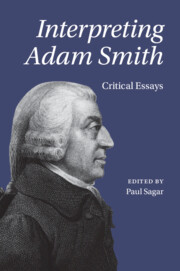Book contents
- Interpreting Adam Smith
- Interpreting Adam Smith
- Copyright page
- Contents
- Contributors
- Acknowledgements
- Abbreviations of Works by Adam Smith
- Introduction
- 1 Smith Scholarship
- 2 The Wealth of Nations as a Work of Social Science
- 3 Adam Smith’s “Industrial Organization” of Religion
- 4 Talking to My Butcher
- 5 What Did Adam Smith Mean? The Semantics of the Opening Key Principles in the Wealth of Nations
- 6 Adam Smith and Virtuous Business
- 7 Adam Smith and the Morality of Political Economy
- 8 A Moral Philosophy for Commercial Society?
- 9 Adam Smith, Sufficientarian
- 10 Narrowing the Scope of Resentment in Smith’s Theory of Moral Sentiments
- 11 Adam Smith
- 12 “Much Better Instructors”
- 13 Sophie de Grouchy as an Activist Interpreter of Adam Smith
- 14 Adam Smith and the Limits of Philosophy
- Bibliography
- Index
12 - “Much Better Instructors”
Adam Smith and the Role of Literature in Moral Education
Published online by Cambridge University Press: 14 September 2023
- Interpreting Adam Smith
- Interpreting Adam Smith
- Copyright page
- Contents
- Contributors
- Acknowledgements
- Abbreviations of Works by Adam Smith
- Introduction
- 1 Smith Scholarship
- 2 The Wealth of Nations as a Work of Social Science
- 3 Adam Smith’s “Industrial Organization” of Religion
- 4 Talking to My Butcher
- 5 What Did Adam Smith Mean? The Semantics of the Opening Key Principles in the Wealth of Nations
- 6 Adam Smith and Virtuous Business
- 7 Adam Smith and the Morality of Political Economy
- 8 A Moral Philosophy for Commercial Society?
- 9 Adam Smith, Sufficientarian
- 10 Narrowing the Scope of Resentment in Smith’s Theory of Moral Sentiments
- 11 Adam Smith
- 12 “Much Better Instructors”
- 13 Sophie de Grouchy as an Activist Interpreter of Adam Smith
- 14 Adam Smith and the Limits of Philosophy
- Bibliography
- Index
Summary
In the final edition of the Theory of Moral Sentiments (TMS), Smith recommends several literary authors – Racine and Voltaire, Richardson, Marivaux, and Riccoboni – as “much better instructors than Zeno, Chrysippus, or Epictetus,” specifically in their illustrations of relationships of love and friendship as well as the “private and domestic affections,” like “parental tenderness” and “filial piety” (III.3.13-4). Smith does not here explain how literature performs this instructive function, and his remarks on the function of literature are scattered across TMS and the Lectures on Rhetoric and Belles Lettres. This chapter contributes to a growing body of scholarship on Smith and literature by focusing closely on this recommendation, elucidating the instructive potential of the early novel, and showing how well suited the techniques of that form are to the goals and challenges of Smith’s sentimentalist moral philosophy. By examining shared themes and formal features of the novels of Samuel Richardson, Pierre Marivaux, and Marie-Jeanne Riccoboni, I show how a reader’s engagement with these novels helps to enable and train their skills as an impartial and sympathetic spectator.
Information
- Type
- Chapter
- Information
- Interpreting Adam SmithCritical Essays, pp. 194 - 213Publisher: Cambridge University PressPrint publication year: 2023
Accessibility standard: Unknown
Why this information is here
This section outlines the accessibility features of this content - including support for screen readers, full keyboard navigation and high-contrast display options. This may not be relevant for you.Accessibility Information
- 1
- Cited by
